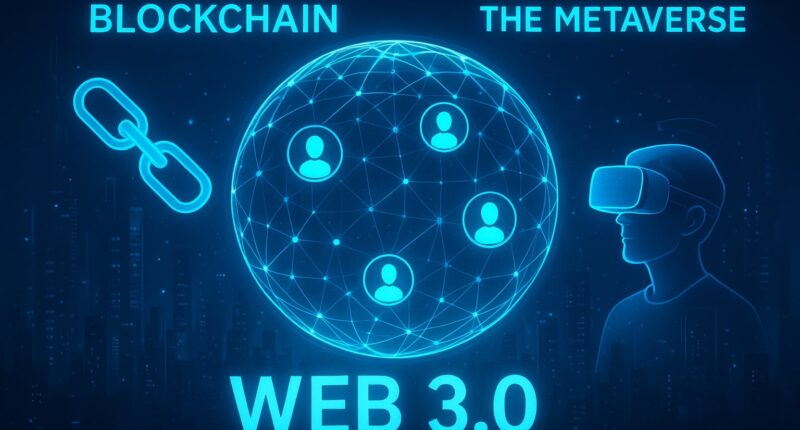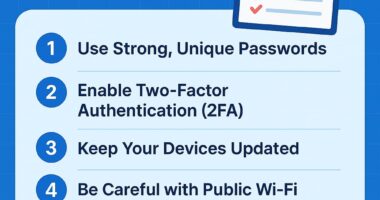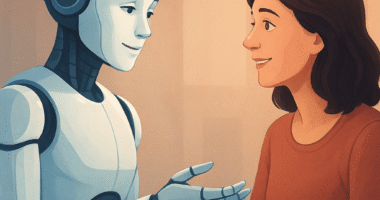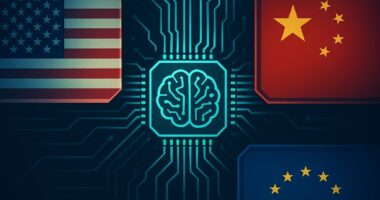Introduction to Web 3.0
Web 3.0, often called the “next generation of the internet,” represents a shift from centralized platforms to a more decentralized, user-controlled web. Unlike Web 2.0—dominated by tech giants like Google, Facebook, and Amazon—Web 3.0 gives users ownership of their data and digital assets. This transformation is made possible by blockchain technology and the emerging concept of the metaverse.
In simple terms, Web 3.0 is about making the web smarter, more secure, and more immersive. It’s powered by technologies such as artificial intelligence (AI), blockchain, virtual reality (VR), and augmented reality (AR), enabling a seamless and interconnected digital experience.
What is Blockchain Technology?
The Foundation of Decentralization
Blockchain technology is the backbone of Web 3.0. It is a distributed ledger system that records transactions across multiple computers securely and transparently. Each record or “block” is linked to the previous one, forming a chain that cannot be altered easily, ensuring data integrity and trust without the need for intermediaries.
Key Features of Blockchain
-
Transparency: All transactions are visible to participants, making it easier to verify data authenticity.
-
Security: Data is encrypted and distributed, minimizing the risk of hacks or data loss.
-
Decentralization: No single authority controls the blockchain, giving users true ownership.
-
Smart Contracts: Self-executing agreements that automatically perform actions when conditions are met, enabling decentralized apps (dApps) and financial systems.
Blockchain powers cryptocurrencies like Bitcoin and Ethereum, but its potential extends far beyond finance. It supports decentralized finance (DeFi), non-fungible tokens (NFTs), and supply chain transparency, shaping the foundation of a user-owned internet.
The Metaverse: A New Digital Universe
Defining the Metaverse
The Metaverse is a virtual 3D space where people can interact, socialize, work, and play through digital avatars. It merges virtual reality, augmented reality, and blockchain to create shared digital environments that mimic the real world—or even go beyond it.
Imagine attending concerts, purchasing virtual real estate, or running a digital business inside a virtual universe—all powered by blockchain-based ownership.
How the Metaverse and Blockchain Work Together
Blockchain ensures digital ownership and trust within the Metaverse. Through NFTs and decentralized systems, users can buy, sell, or trade digital assets—such as art, property, or fashion—without central intermediaries. Each asset is uniquely stored on a blockchain, confirming authenticity and ownership.
For instance, if you purchase a virtual land plot in a Metaverse platform like Decentraland or The Sandbox, the transaction is securely stored on the blockchain, making you the verified owner.
The Future of Web 3.0, Metaverse, and Blockchain
Web 3.0, combined with blockchain and the Metaverse, is transforming how we communicate, trade, and interact online. It’s a future where users have full control over their data, identities, and digital assets.
As more industries adopt Web 3.0 technologies, expect innovations in education, healthcare, finance, and entertainment. The line between the physical and virtual world will continue to blur, creating new opportunities for businesses and individuals alike.
Conclusion
Web 3.0 marks the evolution of the internet into a decentralized, intelligent, and immersive ecosystem. Blockchain provides trust and transparency, while the Metaverse creates new digital worlds and economies. Together, they represent the future of human interaction in the digital age—a future that is open, secure, and truly user-driven.









